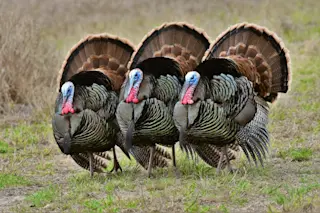According to legend, Benjamin Franklin wanted the turkey to be a national symbol of the fledgling United States. That actually isn’t true.
However, Ben apparently did have a high opinion of the bird. According to the Franklin Institute, when comparing it to the bald eagle, Franklin considered the turkey more courageous and wrote that it was “… a much more respectable Bird, and withal a true original Native of America …. “
Franklin was right to admire the turkey, although even the great scientist, statesman, and founding father didn’t know everything about them. And like anything that becomes attached to a holiday tradition, turkeys have long attracted their own share of myths and misinformation. Here, then, are a few facts we do know about turkeys.
(Credit: Ignacio Lazo Arteaga/Shutterstock)
Ignacio Lazo Arteaga/Shutterstock
While Ben Franklin was correct in believing the turkey to be native to North America, he didn’t necessarily ...















